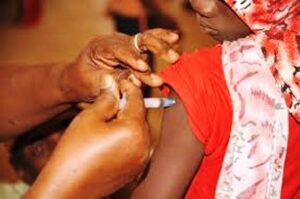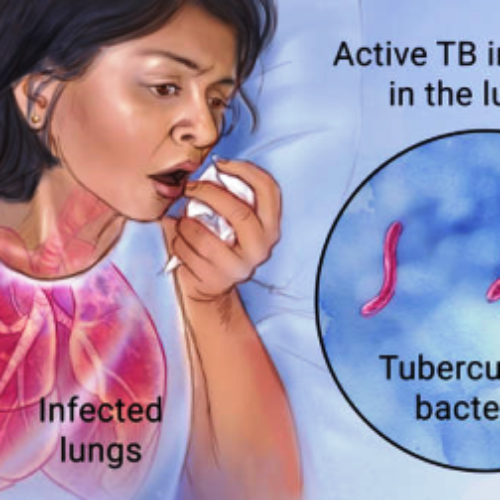Over 500 Patients Recover From Meningitis In Yobe
No fewer than 564 patients out of the 636 recorded cases of meningitis outbreak in Yobe State have recovered, an official has said.
Mr Haruna Umar, the Disease Surveillance and Notification Officer, Primary Healthcare Management Board, disclosed this in an interview with the News Agency of Nigeria (NAN) on Monday in Damaturu.
Umar said that 22 deaths had been recorded with 564 patients fully recovered while the remaining 50 were being observed and managed at isolation centres
He recalled that the first suspected case was reported on Dec 24, 2023 and confirmed on Jan 26.
He added that the 636 cases were recorded across six local government areas of Machina, Nangere, Fika, Fune, Potiskum and Gujba. (NAN)
Facts you should know
- Meningitis is a devastating disease with a high case fatality rate, which can lead to serious long-term complications (sequelae).
- Meningitis remains a major global public-health challenge.
- Epidemics of meningitis are seen across the world, particularly in sub-Saharan Africa.
- Many organisms can cause meningitis, including bacteria, viruses, fungi and parasites.
- Bacterial meningitis is of particular concern. Around 1 in 6 people who get this type of meningitis die and 1 in 5 have severe complications.
- Safe affordable vaccines are the most effective way to deliver long-lasting protection.
Overview
Meningitis is the inflammation of the tissues surrounding the brain and spinal cord. It is usually caused by infection. It can be fatal and requires immediate medical care.
Meningitis can be caused by several species of bacteria, viruses, fungi and parasites. Most infections can be transmitted from person to person. Injuries, cancers and drugs cause a small number of cases.
Bacterial meningitis is the most common dangerous type of meningitis and can be fatal within 24 hours.
Meningitis can affect people of any age.
There are effective treatments and vaccines against some of the main bacterial causes of meningitis. However, meningitis remains a significant threat around the world.
There are four main causes of acute bacterial meningitis:
- Neisseria meningitidis(meningococcus)
- Streptococcus pneumoniae(pneumococcus)
- Haemophilus influenza
- Streptococcus agalactiae (group B streptococcus)
These bacteria are responsible for more than half of the deaths from meningitis globally and they cause other severe diseases like sepsis and pneumonia.
Other bacteria e.g., Mycobacterium tuberculosis, Salmonella, Listeria, Streptococcus and Staphylococcus, viruses such as enteroviruses and mumps, fungi, especially Cryptococcus, and parasites like Amoeba are also important causes of meningitis.
Who is at risk?
Although meningitis affects all ages, young children are most at risk. Newborn babies are at most risk from Group B streptococcus, young children are at higher risk from meningococcus, pneumococcus and Haemophilus influenzae. Adolescents and young adults are at particular risk of meningococcal disease while the elderly are at particular risk of pneumococcal disease.
People all over the world are at risk of meningitis. The highest burden of disease is seen in a region of sub-Saharan Africa, known as the African Meningitis Belt, especially recognised to be at high risk of epidemics of meningococcal but also pneumococcal meningitis.
Higher risk is seen when people are living in close proximity, for example at mass gatherings, in refugee camps, in overcrowded households or in student, military and other occupational settings. Immune deficiencies such as HIV infection or complement deficiency, immunosuppression, and active or passive smoking can also raise the risk of different types of meningitis.
Transmission
The route of transmission varies by organism. Most bacteria that cause meningitis such as meningococcus, pneumococcus and Haemophilus influenzae are carried in the human nose and throat. They spread from person to person by respiratory droplets or throat secretions. Group B streptococcus is often carried in the human gut or vagina and can spread from mother to child around the time of birth.
Carriage of these organisms is usually harmless and helps build up immunity against infection, but the bacteria occasionally invade the body causing meningitis and sepsis.
Signs and symptoms
Clinical features of patients with meningitis vary depending on the cause, disease course (acute, subacute or chronic), brain involvement (meningo-encephalitis) and systemic complications (e.g., sepsis).
Common symptoms of meningitis are neck stiffness, fever, confusion or altered mental status, headaches, nausea and vomiting.
Less frequent symptoms are seizures, coma and neurological deficits (for example hearing or vision loss, cognitive impairment, or weakness of the limbs).
Types of meningitis caused by viruses or bacteria can have similar symptoms. Symptoms may be stronger in some types of meningitis than in others and require different treatment.
Bacterial meningitis pathogens can cause other symptoms as a result of bloodstream infections (septicaemia), which can quickly lead to sepsis, including:
- cold hands and feet
- joint and muscle pains
- breathing faster than usual
- diarrhea
- dark purple or red rash.
- Babies sometimes have different symptoms than adults:
- being less active and difficult to wake
- being irritable or inconsolable
- poor feeding
- stiff or floppy body
- swelling in the soft spot in their head (fontanelle).
Complications and sequelae
One in 5 people surviving an episode of bacterial meningitis may have long lasting after-effects. These after-effects include hearing loss, seizures, limb weakness, difficulties with vision, speech, language, memory, and communication, as well as scarring and limb amputations after sepsis.
Prevention
Vaccines offer the best protection against common types of bacterial meningitis.
Vaccines can prevent meningitis caused by: meningococcus pneumococcus
haemophilus influenzae type b (Hib).
Bacterial and viral meningitis can spread from person to person. If you live with someone who has either type of meningitis, you should:
- Talk to your doctor or nurse about taking antibiotics (in case of bacterial meningitis)
- Wash hands frequently, especially before eating
- Avoid close contact and sharing cups, utensils or toothbrushes.
- Vaccination
Licensed vaccines against meningococcal, pneumococcal and Haemophilus influenzae disease have been available for many years. These bacteria have several different strains (known as serotypes or serogroups) and vaccines are designed to protect against the most harmful strains. No universal vaccine exists.
In the African meningitis belt, meningococcus serogroup A accounted for 80–85% of meningitis epidemics before the introduction of a meningococcal A conjugate vaccine through mass preventive campaigns (since 2010) and into routine immunization programmes (since 2016). Continuing introduction into routine immunization programmes and maintaining high coverage is critical to avoid the resurgence of epidemics.
- Antibiotics for prevention (chemoprophylaxis)
Antibiotics for close contacts of those with meningococcal disease, when given promptly, decreases the risk of transmission. Outside the African meningitis belt, chemoprophylaxis is recommended for close contacts within the household. Within the meningitis belt, chemoprophylaxis for close contacts is recommended in non-epidemic situations. Ciprofloxacin is the antibiotic of choice, and ceftriaxone an alternative.
Identifying mothers whose babies are at risk of getting Group B streptococcal disease is recommended in many countries. Mothers at risk are offered intravenous penicillin during labour to prevent their babies developing Group B streptococcal infection.
Diagnosis
Initial diagnosis of meningitis can be made by clinical examination followed by a lumbar puncture. The bacteria can sometimes be seen in microscopic examinations of the spinal fluid. The diagnosis is supported or confirmed by growing the bacteria from specimens of cerebrospinal fluid or blood, by rapid diagnostic tests or by polymerase chain reaction (PCR). The identification of the serogroups and susceptibility to antibiotics are important to define control measures. Molecular typing and whole genome sequencing identify more differences between strains and inform public health responses.
Treatment
Meningitis is a medical emergency.
Meningitis is potentially fatal within 24 hours and requires urgent medical attention. It usually cannot be safely cared for at home.
Meningitis caused by viruses or bacteria can have similar symptoms. Meningitis can vary in severity, appropriate treatment and care depending on the cause. Meningitis caused by bacteria requires immediate antibiotic treatment.
Any person who shows signs or symptoms or meningitis should seek immediate care at a hospital or health centre. This will verify if a person has meningitis, confirm the cause of infection and determine the right treatment and care.
Meningitis sequelae can have an enormous impact on individuals, families and communities, both financially and emotionally. Sometimes, complications such as deafness, learning impairment or behavioural problems are not recognized by carers and healthcare workers and therefore go untreated.
Those who have lived through meningitis often have health-care needs requiring long-term medical treatments. The ongoing psychosocial impacts of disability from meningitis can have medical, educational, social and human rights-based implications. Despite the high burden of meningitis sequelae on people with meningitis, their families and the community, access to both services and support for these conditions is often insufficient, especially in low- and middle-income countries.
Individuals and families with members disabled by meningitis should be encouraged to seek services and guidance from local and national Organizations of Disabled People (ODPs) and other disability focused organizations, which can provide vital advice about legal rights, economic opportunities and social engagement to ensure people disabled by meningitis are able to live full and rewarding lives.
Source: WHO
About author
You might also like
In Sogunro community, teenage pregnancy rules
Procreation commonly known as child bearing is a divine engagement and one that usually brings joy and excitement to humankind, when it is done at the right time and for
SOEHPON calls for policy on environmental health
The Society of Occupational and Environmental Health Physicians of Nigeria (SOEHPON) has called on the Federal Government to adopt a National Policy and Programme for occupational health in the country. This
Trapped by poverty, blinded by myths: The hidden drivers of Nigeria’s tuberculosis crisis
Despite relentless efforts to curb tuberculosis (TB) in Nigeria, the disease continues to claim thousands of lives annually. The World Health Organization (WHO) 2022 Global TB report shows that Nigeria





0 Comments
No Comments Yet!
You can be first to comment this post!